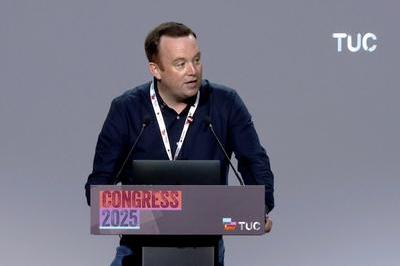TUC Congress 2025: threat of AI to jobs and rights takes centre stage
TUC Congress unanimously supported new laws to stop AI breaching the copyrights of journalists and those working in sectors including books and photography.
This year’s Congress took place in Brighton from 7-10 September, with the NUJ moving or supporting several motions.
AI’s impact on journalism
The NUJ moved a composite motion, titled ‘AI and the creative industries’, with other organisations including Equity and the Musicians’ Union on Tuesday 9 September. The motion urged Congress to back the NUJ’s AI campaign (protecting rightsholders against big tech) and join calls to ensure AI generated content is clearly labelled as such.

Fran McNulty, NUJ joint president, in his address to Congress, cited Reach plc’s announcement this week that it plans to cut over 300 editorial jobs across its titles in a restructuring effort as evidence of the potential negative impact of AI.
The NUJ is seeking further clarity on how exactly AI will feature in the restructure, but it’s clear that this technology will play a more significant role going forward. However, echoing earlier statements by the NUJ, he said that “AI cannot fill the gap” left by journalists made redundant across Reach’s national, regional, and local titles, adding that “Journalism is and always will be a human endeavour.” The union’s position is that artificial intelligence is no substitute for journalism.
Speaking on AI and copyright theft, McNulty said:
“This Congress should be alarmed by the approach adopted by big tech, which seeks financial gain at the expense of rightsholders. When big tech steals information and content - developers must be mandated to reveal the sources of their training data. This will allow journalists, in particular freelance journalists, to seek redress. Any upcoming legislation must require rightsholders to opt-in, not opt out to the use of their work.”
He also spoke about mis/disinformation being promoted by some AI technologies - an issue the government could play a crucial role in tackling through sustainable funding of the BBC and public service media generally.
McNulty added:
“AI is not all bad. In recent weeks a friend and colleague of mine had breast cancer diagnosed by AI, a tiny spec of cancer so small it was not detected by humans. It will make her cancer journey a lot easier. In that case, healthcare workers were assisted by AI for good. The same must be the case across all of our industries when it comes to AI, and the use of AI within journalism must only ever be as an assistive tool with human oversight.
“AI policies must be produced in conjunction with unions through meaningful engagement that ensures the voices of all workers are heard. We must get in on the ground as AI policies are developed and laws are drafted. We as a movement must be in the room - it’s too late dealing with AI when it lands in our workplaces.
“AI is here to stay, but we must protect our members - the singers, writers, reporters, drivers, council workers - everyone is under threat.
“Delegates, video didn’t kill the radio star, it is our role to ensure that AI won’t kill the workers either!”
Speakers from other unions similarly warned about the limitations of AI, stating that it must be viewed by employers as a tool, not a replacement for human creativity.
Hywel Morgan, Equity councillor, said:
“If this government sees AI as the golden goose that rescues the economy, it’s wrong. It’s not the global tech companies that copy, clone, or digitally manipulate the digital data they’ve mined, but the workers, who create the original, innovative, and unique content in the first place that are the seam of gold. Let’s tell the government that this seam is not to be mined without consent, remuneration, and legislation.”
The issue of AI featured in a separate motion on Tuesday, this time in relation to the impact of the technology on workers’ rights more generally. That motion, put forward by Aegis and Community, also passed unanimously. Among other things, it asked Congress to support working with regulators and employers to safeguard jobs, call on companies to adopt responsible AI policies, encourage employers to offer retraining opportunities on AI, and help ensure its use does not limit entryways for young people into employment.
Reporting and portrayal of women
TUC Women's Conference put forward a motion on tackling misogyny, sexism, the rise of incel culture and the far right. The motion, which was carried, called on Congress to support the work of the NUJ in educating and supporting journalists and communications professionals to improve the ethical and accurate reporting and portrayal of women.

© Fran McNulty
Addressing Congress in a speech ahead of the vote, Natasha Hirst, NUJ equality council chair, said:
“We know that ethical reporting is vital to challenge and deconstruct narratives that are built on sexist stereotypes and misogynistic tropes. But we need well resourced, independent journalism to counter the often dangerous and violent disinformation and misinformation that is rife online.”
She also pointed to the appalling misogyny and hate our members have themselves experienced, with Black women journalists especially affected. This is a huge safety concern that spills from online abuse into doxxing, in person physical threats, harm and even death, she added.
The NUJ has taken action and launched an online Journalists' Safety Tracker, which allows journalists to capture and report the abuse they encounter as part of their work. It can be used by members and non-members, freelance journalists and those directly employed.
Hirst said:
“Abuse should never be accepted as an inevitable consequence of doing our job. It is terrifying to be on the receiving end of misogyny in all its forms and deeply alarming to realise how difficult it is to get the tech giants to address or remove harmful content.
“For many, their experiences differ significantly from their male colleagues, but Congress, we know the important role that women journalists play within our industry.
“By speaking out we recognise that all misogyny serves to censor women's voices and limit our presence in the public sphere. That chilling effect on women's journalism harms everybody.”
Issues faced by freelances
Artists’ Union England (AUE) moved a motion calling on delegates to campaign for fairer pay and better conditions for self-employed workers. Pennie Quinton, the NUJ’s London Freelance branch chair, gave a speech before the motion passed about common issues experienced by freelance journalists, including low and late payments.

Quinton said:
"The agreed minimum rates at some publications represent an hourly rate less than the UK minimum wage for a 500-word story that takes 18 hours to produce.
"Not all stories may take that long. But the interesting stories - the ones that justify the whole journalism business - can and should take much longer to do and to do well."
The problems don't stop when a freelance delivers the work. She added that freelance journalists are frequently subject to “the most unfair and unacceptable business terms”, including having to accept payment on publication, which can mean payment is delayed for many months. Some journalists are also required to accept ‘self-billing’, which can lead to being paid less than the agreed fee.
In closing, Quinton said: “The NUJ is calling on the TUC to respond to the government consultation on terms of business for freelances. We need, for example, compensation for late payment to rise enough to be a real deterrent. We hope other unions and the TUC will join us in this effort.”
